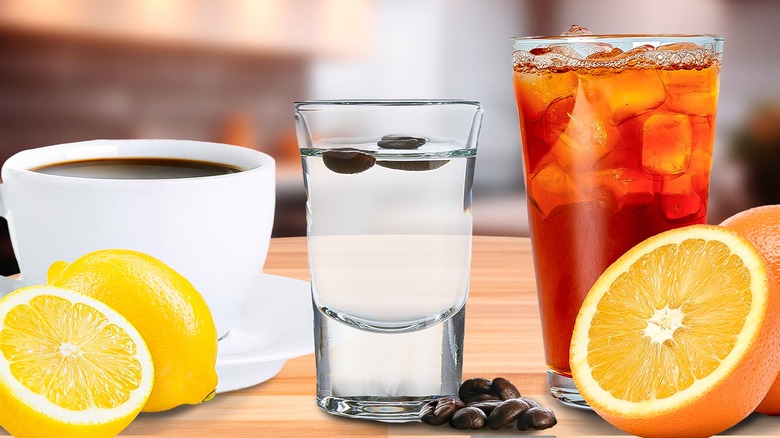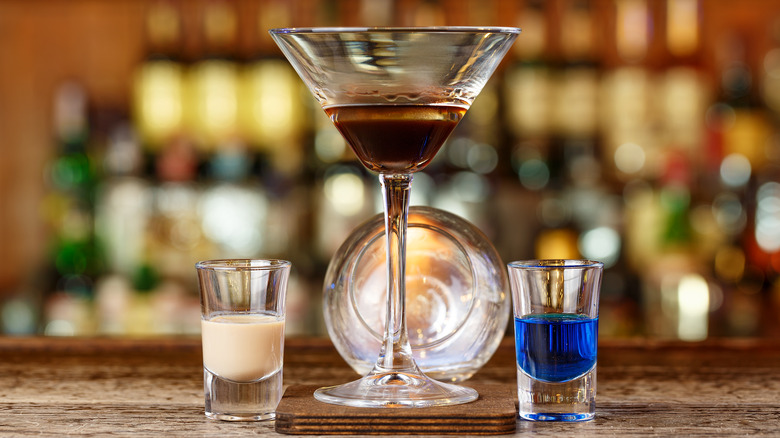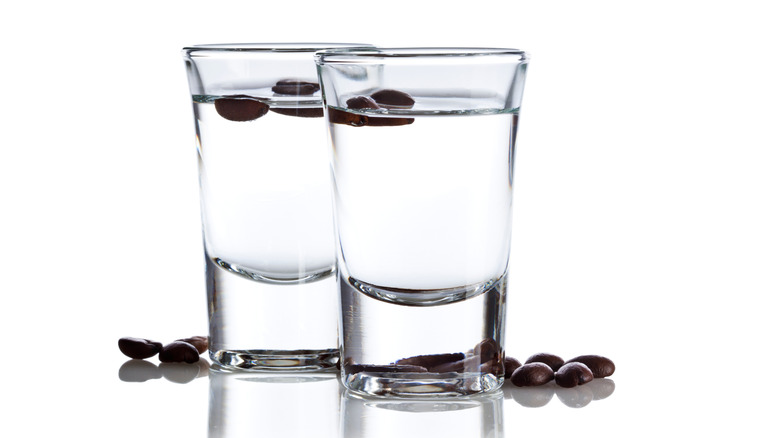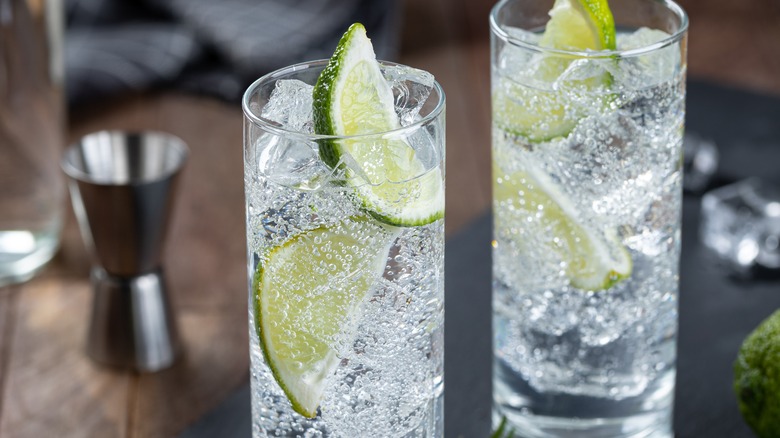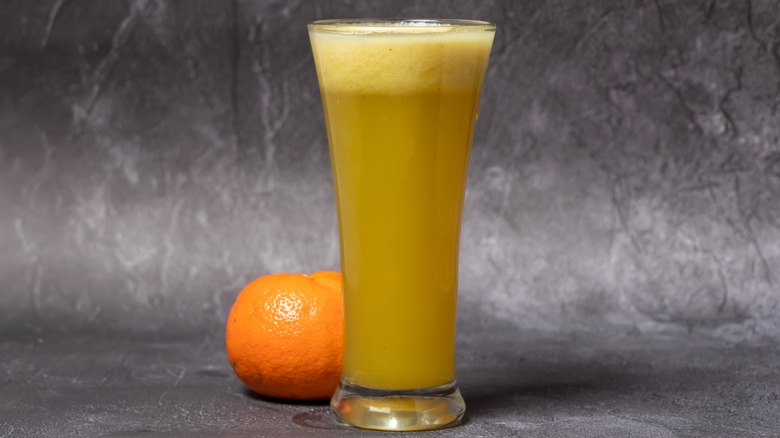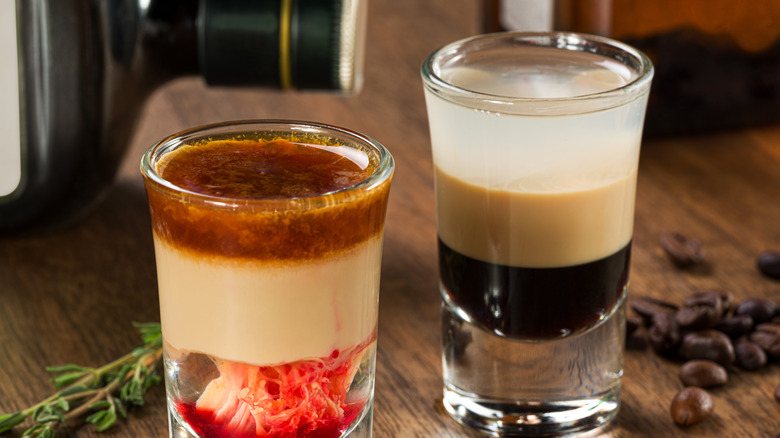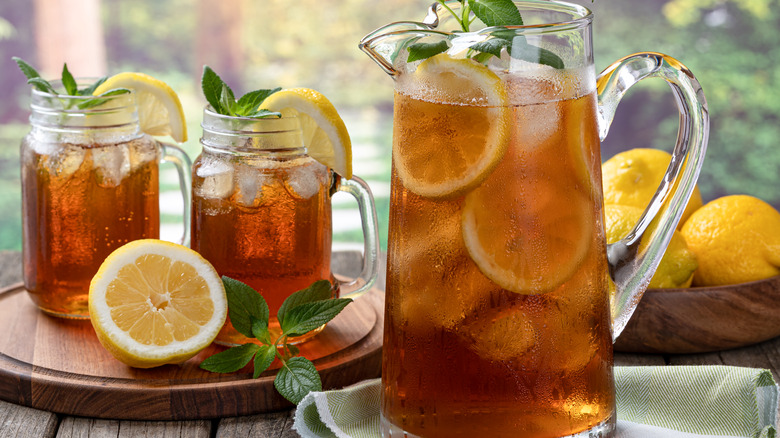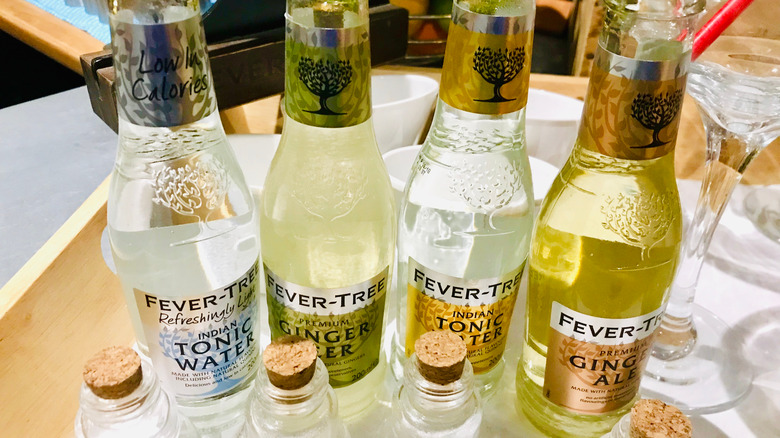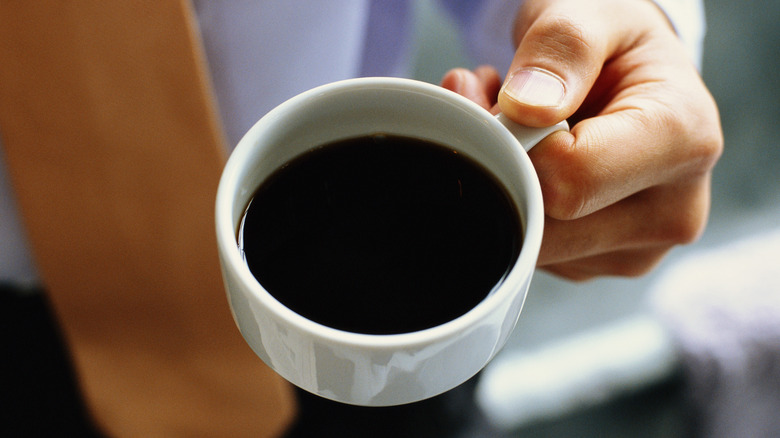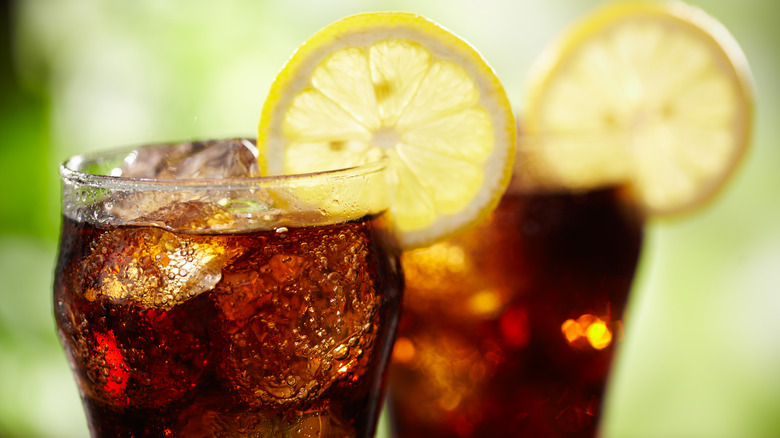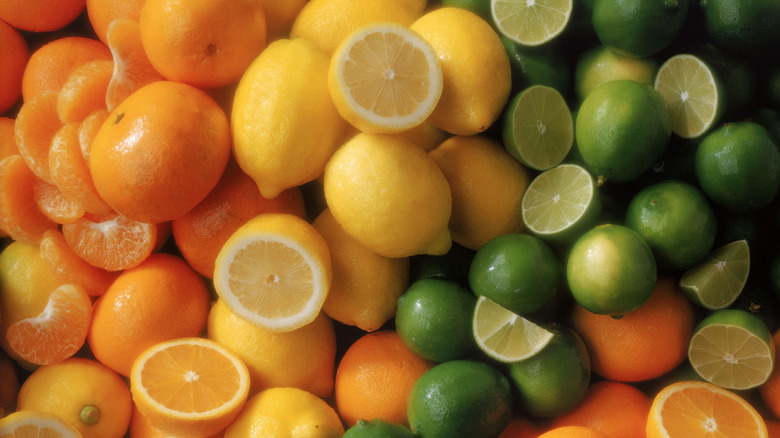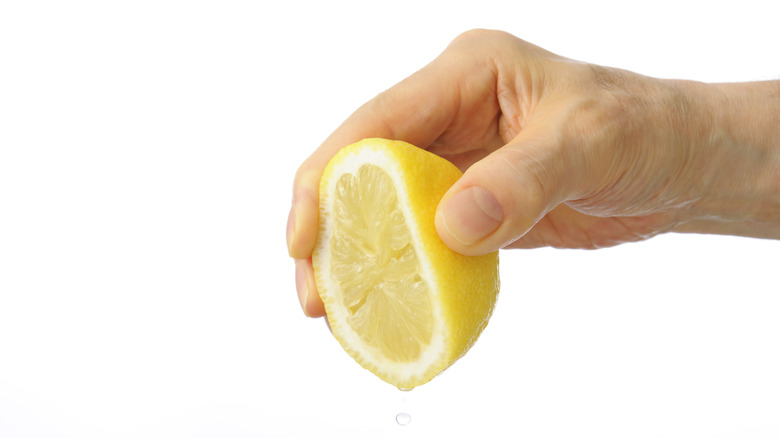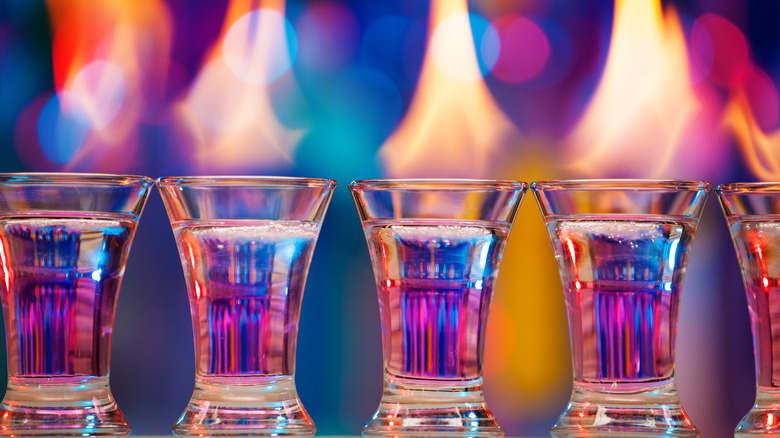10 Delicious Mixers For Sambuca
Delicious? Yes. Polarizing? Also yes.
Sambuca is an Italian liqueur that originated in 1851 by Luigi Manzi, in Civitavecchia, a small town on the outskirts of Rome. The drink gets its unique flavor profile from a spice called star anise. Derived from the fruit of the Chinese evergreen tree, generations of traditional Chinese medicine practitioners have used star anise for everything from treating respiratory infections to dulling the aches of constipation. But you might know it better from waking up sticky with a pounding headache after one too many Slippery Nipple shots. How could you forget? The party memories associated with drinking Sambuca leave a notorious taste in people's mouths.
Most Italians enjoy Sambuca straight, as an after-dinner digestive drink. However, the beverage hasn't quite found room in the hearts of all those who have tried it this way. Regardless of how the rest of the world feels about this liqueur, Sambuca is still alive and well in Italian cuisine. Although Sambuca is traditionally served without any frills, deviating from tradition every once in a while isn't a bad thing. It was designed to be enjoyed, after all. If you want to give this Italian staple a fair shot but haven't found the perfect way to drink it, give mixing it a chance. Due to the liqueur's unique flavor profile, mixing can prove difficult. Not to worry. There are plenty of mixers that let you enjoy sambuca's unique flavors without sacrificing the quality and originality of the drink.
Black sambuca and white sambuca: What's the difference?
There is more than one variety of sambuca. The possibilities for connecting cocktails are endless with flavors such as cherry, raspberry, or coffee. However, we're going to stick with the originals for this article: white and black sambuca. To understand what mixes best with them, let's dig into their core differences.
White sambuca is the original type of sambuca. Black sambuca wasn't introduced until 1989 by Opal Nera. Created at the Francoli Distillery 35 years ago, black sambuca and since its successful launch has brought the spirit spread to over 30 countries around the world. In many markets, Opal Nera is still the No. 1 selling black sambuca.
White sambuca tends to have a lighter taste and lower alcohol content than Black sambuca. Black sambuca is known for its sweet and slightly bitter complexity. Like White sambuca, its main flavor is anise. However, most Black sambuca is also flavored with elderberry, licorice, and sugar. These ingredients come together to create a distinctive flavor profile. It has a stronger licorice flavor and a higher alcohol content than White sambuca. Both black sambuca and white sambuca can be enjoyed neat, on the rocks, or mixed with other ingredients. However, due to their nuanced flavor profiles, you shouldn't substitute one for the other in a cocktail recipe.
White sambuca and toasted coffee beans
Sambuca con la mosca. Or, in English, sambuca with coffee beans. It wouldn't be true to Italian culture if this combo wasn't included in the list. The traditional Italian way of drinking sambuca is straight with three toasted coffee beans on top, each with its own meaning: health, happiness, and prosperity. The popular sambuca brand Molinari describes the pairing of the dry, bitter beans with the sweet aroma of sambuca as "an attempt to reconcile two apparently opposing worlds that were actually made for each other." Eating the coffee beans after the drink is finished is a common ritual that actually serves a useful purpose. When you chew the beans, the bitterness from the coffee and the sweetness of the sambuca balance each other out, acting as a palate cleanser.
This way of enjoying sambuca goes back generations. So, if you've ever overheard your Italian grandmother talking about flies in her drink, it may not be a bad thing. The three toasted coffee beans are served over a glass of sambuca and are often referred to as flies. So, be happy about the flies in your drink. Cheers to a prosperous life.
White sambuca and club soda
The charm of this classic liqueur lies in its unmistakable and distinct anise-infused flavor. As we mentioned, white sambuca is commonly enjoyed straight, with three coffee beans to garnish. Most sambuca drinkers look forward to tasting that pungent anise flavor. But if it's becoming too overpowering after the third tipple, a dash or two of soda can lighten up the flavor. Mixing sambuca with club soda allows the taster to fully enjoy the sweet anise flavor of the spirit in a more toned-down, yet not watered-down form. The added bubbles from the club soda also give this drink a bit of novelty. Who doesn't love a bubbly drink?
Want to switch it up a bit more? Try mixing your sambuca with citrus-flavored soda water like a lemon LaCroix. The citrus flavors complement the sweetness of the sambuca. If you prefer a fresh take, you can slice oranges or lemons and squeeze them into your drink. You can dress up or down this versatile mixer, depending on the setting. For a casual, laid-back vibe, you can pour this drink into a tall glass with ice and sip it on your front porch. Feeling fancy? Pour this drink into a sleek flute glass with a twist of lemon for an air of sophistication and class.
White sambuca and fresh squeezed orange juice
If you feel like mimosas have held the title of go-to brunch favorites for far too long, this pairing is perfect for you. Surprise your brunch crew by going off-script and ordering a sambuca OJ instead of your basic mimosa or screwdriver. Will they be appalled? Perhaps — until they try it. White sambuca and fresh-squeezed orange juice bring together the smooth, anise flavor of sambuca with the vibrant and citrusy notes of the orange. This combination seamlessly blends richness with the bright essence of citrus. It creates a fun, sophisticated beverage with a refreshing twist.
Feel free to play around with the orange juice to sambuca ratio until you strike your perfect balance. This combination is always a crowd-pleaser and is also easy to pre-make large batches and enjoy whenever you feel like it. It's great to serve at brunch and holidays but can be equally refreshing on a sunny afternoon by the pool. If little bits of fruit floating around in your glass throws you off, we get it. If you want to maintain the silky mouthfeel that many people love about sambuca, just swap fresh squeezed OJ for pulp-free! This gives it the same refreshing taste with a smooth texture that'll have you and your friends ordering more.
White sambuca and Irish cream
Sound familiar? It was probably your go-to shot at the college bar. The combination of white sambuca and Irish Cream is a simpler, less sweet, and more sophisticated ode to the popular Slippery Nipple shot. In this version, you keep the same ingredients but skip the grenadine. The herbal undertones of white sambuca complement the silky texture and cocoa notes of Irish Cream, resulting in a drink that is both comforting and sophisticated.
Show your college friends how much you've matured by inviting them over for "grown-up" Slippery Nipple shots. Carefully layer your Irish cream sambuca drink by slowly pouring the Irish cream over the sambuca. Hold your spoon upside down and with it to allow the cream to fall slowly into the shot. The result is a fancy-looking and impressive-looking take on the Slippery Nipple. Enjoy this drink in a shot glass while you reminisce about simpler times. Have as many as you need.
White sambuca and iced tea
This drink was dubbed the "Sicilian Tea" by Romana Sambuca and is not to be confused with the Sicilian tea you may see in high-end cocktail bars. Those are made using Cointreau, amaro, orange juice, lime juice, simple syrup, and sparkling water. As you can see, they don't use sambuca at all. Not very Italian of them, though still delicious we'd say. This simple, classic take on a spiked iced tea calls for 1 ½ ounces of Romana White Sambuca and 5 ounces of iced tea. This combination effortlessly blends the rich flavors of sambuca with the lightness of iced tea. The result is a beverage even Tony Soprano would be proud to drink — with a depth of flavor but crisp as an apple on the taste buds.
This summertime cocktail can be enjoyed in any way you find suitable. For the true Italian experience, drink it out of a tall glass with ice while imagining you're at a small cafe in Sicily. You can use sweet or unsweet, but to keep it Sicilian, use sweet tea. Take it a step further and make some Caponata, a beloved Italian street food known for its iconic and balanced blend of sweet, salty, and sour — and one of our 18 foods and drinks you must try in Sicily.
Black sambuca and tonic
Though black sambuca and tonic doesn't quite roll off the tongue like other go-to mixed drink orders, it is definitely an underrated drink you should be ordering at the bar. In this drink, the sweet, candy-like flavors of black sambuca are ever-so-slightly balanced out by the nuanced bitterness and bubbles of tonic water. This combination allows the licorice and star anise flavors to stand in the spotlight. It also removes the sting that typically follows a sip of black sambuca. This pairing is perfect for those who seek a distinctive twist to the classic gin and tonic. It can be easily whipped up at a moment's notice.
Drinking a black sambuca tonic can be both sexy and mysterious. If you're looking for the perfect Halloween cocktail to go with your witch costume or you need something spooky to serve in your cauldron punch bowl try this dark combination. Make things interesting by adding a spell of edible glitter and watch as your guests become mesmerized — or bewitched by your spooky creation.
Black sambuca and black coffee
We all know the classic vacation conundrum: caffeine or booze? This is usually answered very quickly by everyone in the party with a resounding "Why not both?" We have to agree on this one. Black sambuca is often paired with coffee, as its bold and sweet notes seamlessly intertwine with the robust bitterness of coffee. It results in an easy-to-make beverage with rich flavors and aromatic depth.
If you're a non-whisky drinker, you're probably used to falling into the "let's order Irish coffee" trap. While your local pub may have perfected the Irish Coffee, not every hotel brunch spot has. Next time your friends try to celebrate St. Paddy's Day a little too early suggest black sambuca and coffee. It's a whiskey-free way to enjoy a boozy caffeine boost. Many people use black sambuca in place of cream and sugar for some sweetness with an added twist. Whether you need a little something extra in your morning routine or prefer a refined after-dinner indulgence, there's truly no wrong way to enjoy it.
Black sambuca and cola
If you're a soda person (you know who you are) your friends are probably tired of hearing you order a rum and coke every time you go out. Mix it up by swapping rum out with black sambuca. You'll still get your soda fix, but this time with a sweeter and deeper flavor profile. This drink makes for a quick grab-and-go bar order or a simple yet impressive stay-at-home cocktail night drink. You can adjust the strength and sweetness of your drink by changing the amount of black sambuca you add.
This flavor profile is nothing new. In fact, the combination of star anise and cola has been around for years. It's often used in Chinese cooking. So next time you go out, impress your friends by switching up your usual — and give them a little fun fact about your beloved cola and Chinese culture.
Black sambuca and citrus vodka
This drink is not for the faint of heart. If prefer to taste your booze and aren't one for watering down your drinks, give this one a go. The dark, star-anise undertone of black sambuca finds its perfect counterpart in the bright and invigorating essence of citrus vodka. This spirit-forward beverage perfectly combines the dark sweetness of black sambuca with the striking difference of citrus vodka.
Though light on the palate, the citrus is strong enough to bring out the subtle lemon notes of the black sambuca, without overpowering it. When making this drink, be sure to pour it carefully and not shake it. Because of the dark coloring of the Sambuca, when it mixes with the clear citrus vodka, this drink looks stunning when you sip it from a martini glass. If you order this drink, you are not coming to play. But, you can still make it fun by adding a twist of lemon for effect.
Black sambuca and lemon juice
If our prior suggestion sounds too boozy but you like the idea, this is for you. Like the way that citrus vodka conjures black sambuca's subtle lemon notes, black sambuca, and lemon juice bring out the best in each other. It's almost like a dark, licorice-flavored lemonade. The velvety, licorice-like depth of black sambuca intertwines seamlessly with the vibrant, citrusy notes of freshly squeezed lemon juice. This creates a light, refreshing drink with a hint of sweetness.
This can be enjoyed as a tangy shot, or mixed into a cocktail for a zesty sipping experience. Once you have the basic flavors down, almost anything can be added here. So get creative! Try treating your lemon-sambuca mixture like a Lemonchello shot by adding it to any drink that you think might suit. We recommend a fun take on the legendary Tom Collins drink, which calls for a lemon-sambuca mixture poured over gin and lemon-lime soda.
Sambuca is a delicious digestive aid for health and happiness no matter what you mix it with
Sambuca isn't the easiest to mix. Not to mention everyone is different. Some people prefer the anise flavor to shine through, while others wish to mask it at all costs. Not everyone has a good association with sambuca. Maybe the thought of having one too many — one too many times still sends shivers down your spine. By providing you with a pre-approved list of mixers, guaranteed to please, we hope you'll make room in your heart for this once-despised liquor shelf staple. And if you're already a sambuca fan, we hope this encourages you to go beyond the traditional, get creative, and share the joy of sambuca with your friends.
Beans or no beans, mixed or straight from the glass, sambuca is a delicious digestive aid for health and happiness. May you have health, prosperity, and lots of sambuca in your future.
Methodology
When it comes to selecting the best mixers for sambuca, it's all about striking the right balance to accentuate or dilute its unique aniseed flavor (depending on your preference). Our selection process was guided by the expertise of a professional bartender, who shared valuable insights and recommendations based on years in the trenches being tasked with odd recommendations such as "Can you make a black martini without food coloring?" or "I want sambuca but I don't want to taste it."
First and foremost, we considered the essence of sambuca itself. Its distinct licorice-like flavor profile requires mixers that either complement or contrast it effectively. Sweet mixers, such as fruit juices and sweet teas, can enhance the aniseed notes, while tart mixers, like citrus juices, provide a delightful contrast.
Lastly, versatility was a key factor in our selection process. The chosen mixers had to work well in various cocktail preparations, from classic shots to elaborate layered drinks. Lemon juice, for instance, proved its prowess in both simple and complex black sambuca cocktails, while Irish cream lent itself to both creamy concoctions and espresso-based creations. Most importantly, we approached this with an open mind and a sense of fun.
